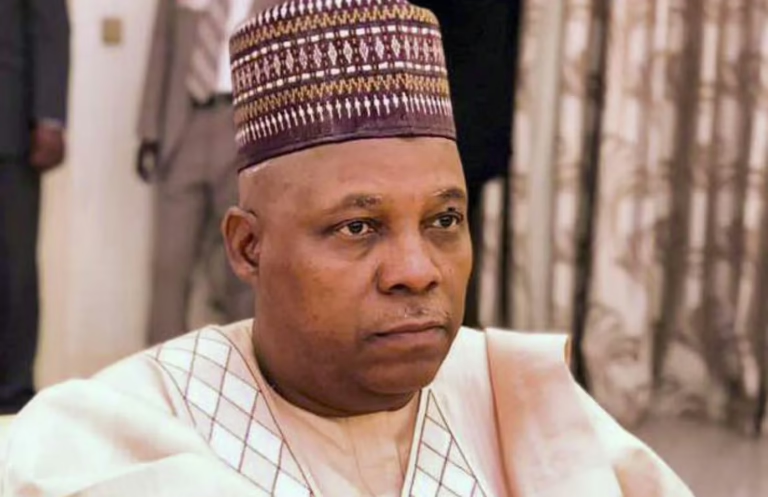Vice President Kashim Shettima has presented Nigeria’s $200 billion opportunity in the energy transition sector to global investors, underscoring the critical role of strategic partnerships to fully leverage the country’s diverse and expansive investment landscape.
Shettima emphasized that Nigeria’s sovereign credit ratings from agencies such as Fitch and Moody’s position the nation as the ideal gateway to the African Continental Free Trade Area’s (AfCFTA) vast $3.4 trillion market.
Seizing the platform, he invited international investors to explore the sweeping economic reforms underway in Nigeria, driven by President Bola Ahmed Tinubu’s Renewed Hope Agenda, which aims to reset and revitalize the nation’s economy.
In a statement delivered by his spokesperson, Stanley Nkwocha, the Vice President spoke at a roundtable organized by the Business Council for International Understanding (BCIU) themed “Risk, Reform, Return,” held alongside the 80th United Nations General Assembly session in New York City on September 22, 2025.
Representing President Tinubu at UNGA80, Shettima stressed that in today’s interconnected world, national prosperity is neither accidental nor inherited but earned through deliberate policy and reform.
He began by highlighting Nigeria’s status as West Africa’s largest economy and Africa’s biggest consumer market, with a population of 236 million projected to reach 320 million by 2040.
Beyond sheer numbers, Shettima pointed out Nigeria’s youthful demographic, with a median age of 17 and over 58% of the population under 30, making it one of the richest reservoirs of talent globally.
“Couple this with our strategic location as a trade nexus linking Africa, the Americas, and Asia; our 44 abundant natural resources; five tech unicorns; Africa’s largest oil reserves; and proven gas reserves totaling 210 trillion cubic feet, and it’s clear that Nigeria is a formidable economic force,” he remarked.
The Vice President outlined the bold economic reset initiated since mid-2023 under President Tinubu’s Renewed Hope Agenda, including the harmonization of exchange rates, elimination of long-standing fuel subsidies that distorted the economy, modernization of tax and customs systems, enhanced fiscal governance, and comprehensive reforms in trade and investment policies.
He elaborated, “This transformation encompasses full AfCFTA implementation, deployment of a National Single Window for trade facilitation, enactment of a new Investment and Securities Act, an upgraded Public-Private Partnership framework, and refreshed bilateral investment treaties.”
Shettima noted tangible outcomes: accelerating GDP growth, bolstered foreign reserves, and easing inflation, all contributing to a resurgence in investor confidence and commitments.
Highlighting Nigeria’s improved economic standing, he recalled Fitch’s upgrade of Nigeria’s sovereign rating to B with a stable outlook and Moody’s elevation to B3, both citing stronger fiscal buffers and clearer policy direction as key factors.
“These upgrades reinforce Nigeria’s role as the natural hub for the AfCFTA’s $3.4 trillion market,” he added.
To attract and safeguard investments, Nigeria has introduced a four-pillar incentive framework aimed at minimizing investor risk, accelerating returns, and positioning the country as a top destination for capital in the Global South.
“Our streamlined tax system now offers transparent capital allowances, R&D deductions, and export-linked rebates. Priority sectors benefit from five percent annual tax credits on qualifying capital expenditures, enabling quicker breakeven points,” Shettima explained.
He also highlighted benefits within Nigeria’s Special Economic Zones, including duty-free imports, rent subsidies, rebates on non-oil export revenues, and integrated logistics solutions that enhance exporters’ working capital.
“Investor protections have been strengthened through updated bilateral treaties, promotion and protection agreements, clear repatriation mechanisms, and simplified foreign exchange access, ensuring capital and profits are secure,” he assured.
Shettima further described how Special Agro-Industrial Zones are cutting post-harvest losses by up to 40%, connecting farmers directly to processing and export hubs, thereby transforming Nigeria into a continental-scale food system serving millions across West Africa.
On the energy front, he revealed, “With 210 trillion cubic feet of gas reserves and some of Africa’s highest solar irradiation levels, Nigeria presents a $200 billion opportunity in the energy transition.”
Fiscal incentives and VAT exemptions are designed to de-risk investments across traditional and renewable energy projects, from gas-powered independent plants to off-grid solar and clean hydrogen initiatives.
Addressing infrastructure gaps, Shettima acknowledged a $1 billion annual shortfall in transport, ports, and power but highlighted government efforts through InfraCorp and the Nigeria Sovereign Investment Authority to blend sovereign and private capital for projects like metro lines, dry ports, and industrial corridors-laying the foundation for West African trade and generating sustainable investor returns.
“Special Economic Zone clusters now boast over $5 billion in installed industrial capacity, with backward integration incentives and AfCFTA corridors unlocking a multi-billion-dollar continental market,” he said.
“These reforms are positioning Nigeria as Africa’s manufacturing hub and innovation center,” he concluded.
The Vice President also noted Nigeria’s wealth of 44 commercially viable minerals valued at over $700 billion under a new beneficiation and security framework.
“Investors have early access to critical resources like lithium, gold, bitumen, and rare earth elements essential for the global green transition,” he added.
Shettima highlighted Nigeria’s digital economy, which accounts for 29% of Africa’s internet usage, has attracted over $2 billion in venture capital, and is training three million new tech professionals.
“This makes Nigeria the continent’s fastest-growing digital hub, with fintech, artificial intelligence, cloud computing, and broadband expansion at scale,” he said.
He also emphasized the creative sector’s growth, a $15 billion industry projected to reach $100 billion by 2030, driven by Nollywood, Afrobeats, gaming, animation, and fashion, supported by intellectual property protections and creative hubs that cement Nigeria’s status as a cultural powerhouse in the Global South.
In healthcare, already an $18 billion sector, progress is bolstered by executive directives promoting local manufacturing, a $1.57 billion World Bank primary healthcare initiative, and specialist centers developed by the Nigeria Sovereign Investment Authority.
Earlier, Minister of Industry, Trade and Investment Dr. Olajumoke Oduwole reiterated that since May 2023, Nigeria has undertaken one of its most ambitious economic overhauls under President Tinubu’s Renewed Hope Agenda, including exchange rate unification, subsidy removal, tax and customs modernization, and enhanced fiscal oversight.
She added that the administration revamped trade and investment policies, fully implementing the AfCFTA, launching a National Single Window for trade, enacting a new Investment and Securities Act, upgrading the Public-Private Partnership framework, and modernizing bilateral investment treaties.
Oduwole noted visible impacts: accelerating GDP growth, stronger external reserves, moderating inflation, and a rebound in investment commitments.
“In April, Fitch upgraded Nigeria’s sovereign rating to B with a stable outlook, and Moody’s raised its issuer rating to B3, also stable,” she said.
“These improvements, driven by clear policy direction, have attracted over $50 billion in investment interest across key sectors,” the Minister concluded.
Earlier that day, Vice President Shettima, representing President Tinubu, attended the 80th anniversary high-level meeting of the United Nations General Assembly at the UN Headquarters.
President Tinubu delivered a brief address celebrating the UN’s legacy of peace, human dignity, and sustainable development achievements.
The Vice President was accompanied by Kaduna State Governor Senator Uba Sani, Minister for Solid Minerals Development Dele Alake, Minister for Arts, Culture and Creative Economy Hannatu Musa Musawa, Women Affairs Minister Iman Suleiman-Ibrahim, and officials from the Nigerian Mission in New York.

















